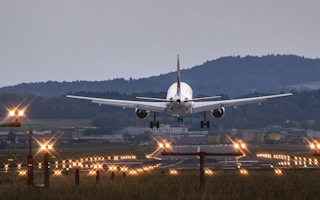A United Nations body that oversees commercial air travel, has defended its structure and procedures following a report questioning its ability to lead on sustainability issues.
UK-based think-tank InfluenceMap had published a report that said proceedings at the International Civil Aviation Organization (ICAO) are too opaque and have too many corporate representatives involved.
An ICAO meeting is currently taking place in Montreal, Canada, and negotiators are expected to discuss getting countries to commit to net-zero commercial aviation by 2050, up from the current target of halving emissions by then.
In response to queries, an ICAO spokesperson said decisions taken at its meetings are only made by countries, with observer groups, including industry players, providing technical expertise. Environmental and climate bodies within the United Nations are also observers, while ICAO has a “robust” reporting and investigation procedure regarding the neutrality of its secretariat staff, the spokesperson said.
The spokesperson said ICAO is not told if national representatives at its meetings are also employed by firms. The InfluenceMap report said over 20 people representing states are employed by aviation or fossil fuel firms.
The ICAO spokesperson added that the use of non-disclosure agreements, which the InfluenceMap report had said would affect the transparency of ICAO workings, is “not unusual” in standard-setting work given that privileged technical information needs to be freely discussed. A website link to a list of members of ICAO’s committee on aviation environmental protection was provided to Eco-Business.
ICAO, as a standard-setting body, does not have a mandate to decide which air services should operate or not, the spokesperson added. The InfluenceMap report had pointed out that ICAO has not promoted measures to curb flying to help meet climate targets, despite concerns that better technology for the sector will not help it decarbonise fast enough.
The spokesperson said ICAO was not contacted by InfluenceMap prior to the release of its report.
“Confident” of full decarbonisation
ICAO said that reaching net-zero emissions by 2050 for the aviation sector is possible, given technological improvements and efficiency measures like using better flying routes and airport procedures.
“With an entire world of innovators now working to address related challenges, in air transport and many other technological domains, we feel confident that aviation will be able to fully decarbonise in the next three decades,” ICAO said.
Sustainable aviation fuels, from algal or waste-oil sources, have been developed and scaled up in recent years, although it only made up 0.01 per cent of total aviation fuel consumption in 2019, according to the International Energy Agency. Electric commercial planes are also on the drawing board.
There is an aviation carbon-offsetting scheme in place, called Corsia, where airlines can purchase carbon credits to balance out their carbon emissions. Critics say the voluntary nature of the scheme, which will be in place at least till 2026, weakens its effectiveness, as does a change in baseline year which could mean airlines need to do less offsetting.
Commercial aviation is generally regarded as a sector that is hard to decarbonise, as alternatives to the highly-refined kerosene fuel needed are difficult and costly to produce. The industry contributes to almost 3 per cent of global emissions, and total emissions could more than double by 2050, according to research group Climate Action Tracker.
While jet travel tanked due to Covid-19, the industry is on track to fully recover by 2024, and post 70 per cent growth from 2019 by 2040, according to major industry group International Air Transport Association (IATA).
An IATA spokesperson said Corsia is a short to medium term “stop-gap measure” that is not directly related to delivering net-zero carbon emissions by 2050. The association has been a key proponent of the scheme during its development in the past few years.
Countries worldwide adopted an aspirational 2050 net-zero emissions target at the end of last week (7 Oct).
This story was edited and updated on 10 Oct to include IATA’s response.

















